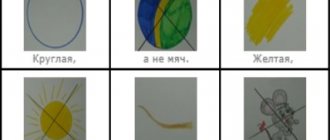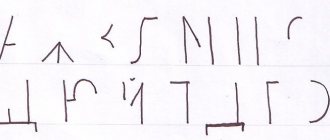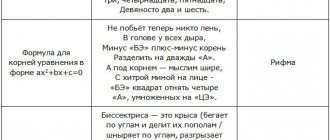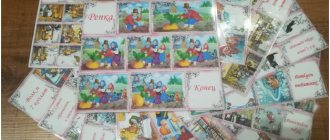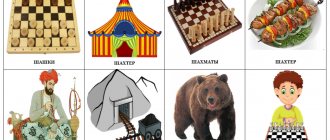Mnemonics for children (and not only)
It is quite difficult to explain to a four-year-old child how to create a memory palace and start using it. He is unlikely to want to learn BCC and figurative codes. But that doesn't mean he can't start using mnemonics. In this article, we will look at methods of effective memorization, suitable for the youngest (but parents’ help will be needed in the first stages), and we will try to make memorization more interesting in the eyes of the child. So, what techniques for easier memorization of information are suitable for children?
Acronym
This is the selection of a phrase in which the first letters of each word will correspond to the first letters of the memorized words. most famous example an acronym: every hunter wants to know where the pheasant is . It helps you remember the sequence of colors in the rainbow. Using an acronym, you can remember any not very large sequence of words in the right order. Let me give you a couple more examples of acronyms:
If you really need cartographic information , learn to read letter characteristics carefully . _ _ _ _ _ _ _ _ Helps to remember the order of cities through which the Trans-Siberian Railway passes (when moving from west to east): Ekaterinburg , Tyumen , Omsk , Novosibirsk , Krasnoyarsk , Irkutsk , Ulan -Ude, Chita , Blagoveshchensk , X Abarovsk, To Ladivostok.
Every good student should eat a calorie - rich diet . _ You , Yura , little one , go find the cheburek . This acronym corresponds to the sequence of geological periods: Cambrian , Ordovician , Silurian , Devonian , Carboniferous , Permian , Triassic , Jurassic , Cretaceous , Paleogene , Neogene , Quaternary .
As you can see, using an acronym you can remember quite complex information. Quite a lot of ready-made acronyms can be found on the Internet, but it will be very useful to be able to create them yourself. To do this, you must follow the following rules:
Logics. Your acronym should make logical sense. If we replace one chaotic word order with another, we will not achieve a positive effect. It is advisable that this be some kind of short story or situation. Compare the examples given: in the first case it is just a sentence, and in the second it is also some kind of sketch about Yura’s student life and life (the situation is described). Try to keep your acronym closer to the second example, make it situational.
Imagery. It’s no secret that people remember visual information much better. Mnemonics is based on this rule. Compare the two examples described above again. In the first case, we cannot imagine anything. It's just word order. The only thing that makes the task easier is that the sentence has a logical connection. In the second example, we can already imagine at least the hungry student Yura, who is looking for a cheburek. Therefore, the second option is more convenient to remember. And it is more interesting for children to listen to stories, some cases, rather than abstract concepts.
Language. It is advisable that your acronym contain as few frankly unnecessary words as possible and that it be as close as possible to colloquial Russian. Let's go back to the examples again. The first one sounds a little unnatural: hardly anyone in life says something like “learn to read letter characteristics carefully.” There is not a single unnecessary word in the second acronym. You will say that “excellent” can be omitted, but if we perceive this as part of the story (those who study well need more energy and, as a result, higher calorie intake), then absolutely every word matters, and we are unlikely to forget any of them (because in this case the situation will take a different form). Also, the second acronym is “more colloquial” and easier to remember. If we talk about mnemonics for children, a small child simply will not remember a sentence with a complex structure and difficult words.
Clarity. You will be able to remember the correct word order, but you will not remember the words themselves this way. That is, you may know that “every excellent student should eat a caloric diet,” but if you don’t know the words Cambrian, Ordovician, Silurian, Devonian, and Carboniferous, then the acronym will not help you. The child must first know approximately what colors are in the rainbow, and then remember what the hunter wants and where the pheasant sits. If some memorized words begin with the same letter and your child confuses them, then it makes sense to select similarities not only by the first letters, but by two, three, or the general consonance of the words. For example, if there is confusion between the Cambrian and the Carboniferous, the acronym can be modified: “Cambridge Excellent Student...”.
Unusual, funny and bright. The more unusual, funnier, and colorful your acronym is, the better. Yes, let's look at our examples again. The first one is absolutely boring. There is no dynamics, nothing can make you smile, there is no liveliness. Your situation should be non-standard and at least funny. A child will quickly grasp something that makes him laugh and will have difficulty remembering something that seems boring to him. He must get used to the fact that he can (and should!) learn in a fun way, and not by cramming something because he doesn’t want to. Create colorful, funny and amazing acronyms for him, make sure that the child himself wants to learn something new!
Try it! Find a topic that will interest your child (or interest him yourself: for example, show him the Solar System, tell him a little about space and then ask him to remember the order of the planets in it). Come up with an acronym, explain why it is needed and how it helps you remember. If the acronym is coined correctly, and your child is interested in this topic, then he will probably remember it immediately and for a long time. Ask him periodically to repeat the memorized acronym.
Acrostic
This is a type of acronym in which the first letter of the memorized word corresponds to the first letter of a line in the poem. The rules for composing are the same as for an acronym, only in addition there must also be a rhyme. Creating acrostics is more difficult than acronyms, and the former contain a lot of extra words that you don’t need to bother your children with. I recommend using an acronym more often (this is a more effective way), but in some cases you can use acrostics (if it is difficult to come up with an acronym or the child cannot remember it for some reason).
Poems
Poetry is easier to memorize than prose. Rhyme itself is already a mnemonic device. With the help of poems you can remember grammatical rules, traffic rules, spelling norms, etc.
For example, exception verbs related to the second conjugation:
Drive, hold, look and see, Breathe, hear, hate, And depend, and endure, And offend, and twist.
A common mistake in the words put on/dress:
Put on clothes, put on hope.
I would like to pay special attention to spelling: verses for remembering the correct placement of stress, in my opinion, are as effective as possible:
Sun. Hot. Bring us blinds and .
We ate our mouths for a long time - the shorts didn’t fit.
dancing girl and dancing girl love their little ones to have balls . On the kitchen table they let the kittens dance.
Since we touched on the topic of the Russian language, I advise you to take the appropriate course.
There are a huge number of ready-made mnemonic poems on the Internet; all you have to do is find them and interest your child in memorizing them.
Try it! Come up with a funny rhyme that will help your child remember what he often forgets.
I would also like to remind you of the story method. Come up with, or better yet, invite your child to make up a story that lists the memorized information in sequence. It's very exciting and develops the imagination! And don’t forget about the method of phonetic associations; the child will remember simple words on his own, but this method will be useful for memorizing complex words.
And most importantly: teach your child to create acronyms and write poetry on their own. Yes, he won’t succeed the first time, but if you demonstrate more and more examples, arouse sincere interest, then after some time he will be able to use mnemonic techniques without your help. This will give impetus to its development.
Mnemonics are available to every person, starting from a young age. It can make memorization easier and, which is especially important for children, more interesting. Transform learning from tedious cramming into an exciting creative process (and at the same time train your creative abilities yourself). Learn, teach your children, do it easily and have fun.
I wish you success!
Author: Igor Boltovnin
Did you like the article? Join our communities on social networks or our Telegram channel and don’t miss the release of new useful materials: TelegramVKontakteFacebook
We also recommend reading:
- Storytelling
- Mnemonics for beginners
- Mnemonics: remembering foreign words
- How to learn any language in a few months - tips from a polyglot
- Exercises for memory development in preschoolers
- Mnemonics: personal experience
- Mnemonics: numbers
- Mnemonics. Where to begin?
- Mnemonics for adults: stop forgetting - start remembering
- Types of memory and their features
- How to remember information: a selection of useful materials
Key words:_D1040, 1Children
